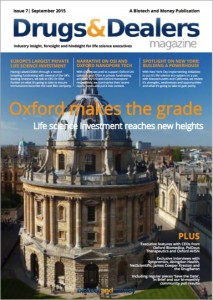‘Biotechs and the City’ Part 7a/7 - Group Q&A
The following panel transcript is group Q&A taken from the 4th September ‘Biotechs and the City’ – Tech Transfer, Translational Funding and Start-Up Capital event held at Imperial College Incubator, and produced by Biotech and Money and sponsored by Marks & Clerk LLP.
The panel included Keith Blundy from Cancer Research Technology, Dr Allan Marchington from Apposite Capital, Tony Hickson from Imperial Innovations, Dr Mike Capaldi from Edinburgh BioQuarter, Richard Seabrook from the Wellcome Trust and Simon Portman from Marks and Clerk.
Terry O’Dwyer: Before we open up to audience questions, I’m going to ask 1 or 2 questions to the panel. We’ll start with looking at challenges. I think Allan mentioned management as one of the biggest challenges facing technology transfer experts. So I wanted to ask the whole panel, what do you see as the single biggest challenge facing technology transfer experts? And from your respective organisations how are you tackling that at the moment? So perhaps we could start with Keith and work our way down.
Keith Blundy: It’s going to be the same as everyone else, it’s always funding. As I said there’s always a gap, having the finance to fund some work and get it to that next point that will make it interesting. But we always tend to in these forums talk a lot about therapeutics. I actually think we’re very lucky, we’re quite well set up to deal with therapeutics, but an area we find much more difficult is the whole diagnostics space and knowing how to develop things for eventual commercial development in the diagnostics industry. We just don’t have the same skill sets. We don’t have the same capabilities. And I’m not sure the path is as clear, because you have so many different platforms you have to try and build for. So if you ask me what we might be thinking about more in future, how we do something to allow us to take forward the variety of diagnostic or biomarker opportunities that we get from our science.
Allan Marchington: For me it’s about generating that excitement and enthusiasm, and the ability for the entrepreneur to see they can make some money. Everyone has to make some money and you’ve got to make sure it works. So if you’ve got a guy who’s done it before and made a lot of money, his bar goes up quite high in terms of what his next gig is going to be. And can he see a vision and can he see a platform? Or do you risk it on a first time CEO who has never done it before? It’s a real difficult balance in that sort of game. As Keith said, the diagnostic space is a tough one. For me I struggle to see how to make money in diagnostics just because there is so many platforms. So getting an entrepreneur into that space, is quite hard. Drugs is much simpler, if the science lays out. So for me it’s about aligning the interest and getting the vision. If we’ve put money behind it, we can sell the vision, that’s what I hope, to someone who is really good.
Tony Hickson: I agree with both of those. Actually our problem with management, is sometimes in medtech, as in medical devices, there’s lots of therapeutic management. Sadly as a result of the state of the British pharmaceutical industry shutting down things, we actually benefit from the availability of talent coming out of pharmaceutical industry that we can deploy in start-up companies. So there is a benefit there in recycling talent. Actually, quite an interesting one to look forward with is what is going to be the net result of impacts and ref in terms of the academic mind-set? We are starting to see a change in the way academics and certainly junior academics are thinking about the application of their research in the future. Because they are being judged on it and the university is being judged on it. Sometimes we actually see the academics now who wish to form companies when actually it’s not appropriate to form a company. We have the opposite problem of trying to carefully manage expectations as to the appropriate way to move technology forward.
Mike Capaldi: So to add another one I think one of the biggest challenges is a challenge that the technology industry went through 30 years ago; that is how to move from being a technology push organisation to a market pull organisation and that’s part of what you’re talking about in terms of the ref and impact and academics starting to be more in tune with the market, and actually applying research more to meet market needs rather than just ‘I’ve got an interesting technology.’ How many times have we seen a very interesting bit of technology and the market is huge, and actually when you go and look at it there are another 20 products in development and 3 of which are 4 years ahead so it would be a waste of time taking it forwards because it’s never going to succeed. I know that we don’t want to detract here, good science can be basic science it can be applied science. It’s a culture change thing, and I think the impact and the ref will have a big impact on that.
Richard Seabrook: Trying not to repeat too many of the previous comments. I’d just like to pick up on this thing about the management teams. Clearly as a funder if you’re presented with a compelling programme, intellectual property asset and management team, that’s a very tempting prospect. But we’re a bit more open-minded than that. We are prepared to fund people who it is there first time round. Actually that has proved to be quite a good source of success for us. I do think we need to get away a little bit from having to back people with track records. What we want to be backing are actually people with ambition and people with good ideas. They don’t necessarily come from existing companies or from large pharmaceutical companies where actually they’ve existed in a fairly luxurious environment. As funders we need to be a bit more open minded, and that is a challenge. Because it’s harder to convince people to fund someone with a track record, and that is more difficult.
Simon Portman: I think one of the issues that we’ve found is that companies, as we’ve heard, they may have an idea and they may have the technology but they often don’t have any concept of whether there is a market for it. It can be quite difficult to tell them that sometimes with new companies. We had a session a few years ago and we had a whole bunch of start-ups in, we had a whole issue about using your IP to make money from the company. It was in the middle of the credit crunch, and unless you had the words ‘making money’ in your title nobody would turn up. Then we gave them a free session afterwards to have a look at their technology and most of them had science that was good. All but 1 though, we had to say you will have to go away and think again. It was either this is already out there as you should know, or why would anyone want this, or you are probably the last person who should be trying to flog this. Those were the main problems.
Also another thing to come back to is the problem of technology transfer offices having a funding and resources problem, I think that’s not there for them. I still find working for companies and TTO’s, a lot of them suffer quite a bit from not having the people who have been there all the time, it was encapsulated to me a few years ago, we had a meeting, it was very close to completion of a spin out company. We had the technology transfer office there, me, the founder of the company and the VC and the lawyer for the university said ‘I know we’re meant to complete tomorrow, but I only work part time and I’m not in tomorrow.’ And my client somewhat embarrassingly said ‘on a personal level I sympathise, on a professional level I don’t really give a toss.’ There was an uncomfortable silence. The fact was they were relying on people who weren’t there and couldn’t afford to have people there all the time, that’s still a real problem.
Part 7b/7 – Audience Q&A will be released Thursday afternoon. However, if you can’t wait for the release of the remaining pieces of content taken from the 4th September ‘Biotechs and the City’ event held at Imperial College Incubator and sponsored by Marks & Clerk, you can download the full transcript here including the group Q&A.
If you’d like to attend any of the forthcoming events in the ‘Biotechs and the City’ series, you can see our October and November offerings here.





Leave a comment